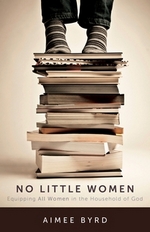 No Little Women: Equipping All Women in the Household of God
No Little Women: Equipping All Women in the Household of God
by Aimee Byrd
Paperback, 278 pg.
P&R Publishing, 2016
Read: February 12, 2017

This book is — by and large — an examination and critique of contemporary Women’s Ministries, and the materials marketed towards women in a Christian context. Byrd doesn’t call for an abolition of Women’s Ministries — but does want to encourage women and the churches that they’re members of to evaluate these with a greater level of discernment, for churches to work at cultivating and equipping female members the same way they seek to for the males in the congregation.
Byrd examines the warnings Paul gives about those seeking to deceive and lead away women — and the impact that would have on the churches of the First Century (and today!) when they succeeded in drawing away women from the truth. Why does Paul focus on women in this context? Should pastors today do the same? Which leads to a discussion of the proper means and motives for educating the females in a congregation, and the roles that women (and laymen) should have in the ministry of the Church.
Byrd discusses (and critiques) the contemporary concept “ministries” of the Church in contrast to The Ministry of Word and Sacrament. And in that light, examines the role of “Women’s Ministries” (even if she finds the term problematic, it’s what everyone uses, so her discussion needs to use the term) in the Church today. So much goes on in even conservative, confessional churches under the umbrella of Women’s Ministry that diverges from — even flat-out contradicts — the teachings from the pulpits. How did we get to this point, and how does the Church respond to this in ways that will lead us all to maturity without causing harm and disunity in a local congregation?
Byrd doesn’t claim to have all the answers here, but she has some good places to start. One of the biggest ways is to improve the level of involvement from Church Leadership in the Women’s Ministries/Initiatives. Another is to improve discernment in women when it comes to dealing with books/teachings marketed toward them. Byrd devotes a chapter to citing problematic (and worse!) passages in popular books targeted to the Christian Woman Non-Fiction audience, with questions that discerning (or would-be discerning) readers should be asking. She even includes questions that people should be asking about No Little Women!
It should be noted — and stressed — that nowhere does Byrd argue for a change in the Church’s teaching on male/female relationships and roles, female ordination, or anything along those lines — she does argue that we might not be the best at applying those teachings right now.
What makes this book poignant is Byrd’s repeated call — maybe pleading would be a better way of putting it — for Church Officers (Pastors, Elders) to pay attention to the theological and spiritual development and education of the women in their congregations (and the never stated, but obvious, indictment of the all-too-frequent abandonment of their call in this regard). Yes, when it comes to the official and regular Ministry of Word and Sacrament, these officers are doing their duty — but when it comes to the books (and other materials) marketed towards them, the studies they use, the “Women’s Ministries,” etc. — all too often, it’s ignored. Byrd asks for Shepherds and Leaders to step up and help the women in their congregations — and even gives some tips for how they can effectively relate to these oft-neglected parishioners. Do I think most of the men she’s addressing here think they’re ignoring any part their flocks? No (and I doubt Byrd does either), but they sure appear to be.
A quick digression: At one point, Byrd cites statistics saying that Women buy 72% of the Christian Fiction sold and 59% of the Christian Non-Fiction, and another survey stating that Women read twice as much Christian Non-Fiction as men. Seriously? This is rather disheartening. What do Christian men read? Are we (on the whole) an illiterate group? This blog isn’t the proper setting for this question — and I’m sure not the one to answer it, but I hope someone takes this up (Sinclair Ferguson helps to remedy the problem in this small [and 15-year-old] booklet).
Byrd writes in her typical straight-forward manner, in a prose that’s smooth and easy to read. Despite challenging her readers, she never comes across and condemnatory or anything but encouraging. There’s a call to action (sometimes implicit, frequently explicit), but consistently done in a positive manner. Byrd’s seeking to improve how the Church — women, pastors/elders, and laymen — carries out Her mission, not to tear down.
Ultimately, I’m not one of the main target audiences — women and Church Officers — so I had a hard(er) time really getting into sections of this book than I’d like. But as a husband, father of a daughter, and layman concerned with the theological education of his fellow laity — a lot of this book was alarming, yet encouraging. Someone’s taking this seriously — and hopefully she’s raising enough awareness that others will follow suit. You don’t have to be a feminist or ecclesiological revolutionary to be concerned with the state of theological training of Christian women (and everything she says about Women goes for our teens and children) — it’s a matter for all laity to take up. This is as close to a must-read as I can think of.
—–


